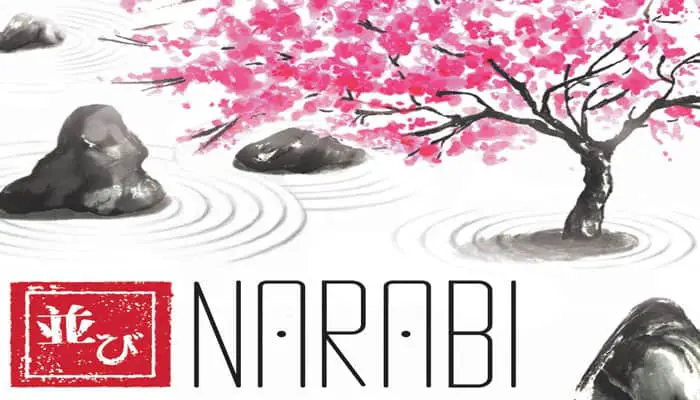

Components
- 15 Stone Cards
- 15 Card Sleeves
- 15 Restriction Cards
- 1 Score Card
- 1 Score Marker 1 Rulesheet
Object of the Game
Narabi is a cooperative game in which players work together to create tranquility out of disorder.
You exchange stones with each other to arrange them in numerical order around the table (either clockwise or counterclockwise), and attempt to do so in as few turns as possible. All players either win or lose together.
Ignore blank stones when determining whether the stones are in order.
Setup
-
If you have played the game before, remove all cards from the card sleeves. Separate the stone and restriction cards, then prepare them based on the number of players:
Three or Four Players: Return one blank white stone card, one blank dark stone card, and the "9" stone card to the box. Return three random restriction cards to the box.
ive Players: Use all 15 stone and restriction cards.
-
Shuffle the restriction cards and stone cards separately.
-

Without looking at the restriction text, insert each restriction card into a card sleeve, then insert one stone card into each of those sleeves with the restriction text visible on one side and the stone visible on the other. Together, the sleeved cards form a stone with a restriction.
-
Shuffle the stones and deal them stone-side up based on the number of players:
- Three Players: Four stones each
- Four or Five Players: Three stones each
Lay out your stones next to each other in front of you, in the order they were dealt, so that the stones form a circle around the table. You cannot change the order of your stones on the table. Make sure that the stone sides are visible to all players.
Important: You can look at the restrictions on your stones, but you cannot show them to other players.
-
The most organized player takes the scorecard and puts the score marker on the "0" space.
Game Play
The game is played over a series of turns, starting with the player with the "0" stone and proceeding clockwise.
During your turn, you must switch the position of one of your stones with another player's stone, while following the restriction on your stone. You cannot switch two of your own stones.
After each turn, the organized player advances the score marker one space. Players continue taking turns until the game ends.


Blank Stones are considered to have a value of zero for the purpose of restrictions, but not for the order of the stones. zero is an even number.
Tabletalk Rules
You can always secretly look at your stones' restrictions, but cannot show them to other players or indicate what they are.
You can ask yes-or-no questions like, "Can you switch that stone with this one?"
You can discuss strategy and future moves as long as you do not discuss restrictions. For example, "Can you help switch any of my stones?" is allowed, but not "Can you switch that stone with one of my odd stones?"
The final decision on switching stones is always made by the player taking their turn.
Narabi is a game about working together to solve an interesting puzzle, and these rules are intended to facilitate that.

End of the Game

If all the stones are in numerical order (either
clockwise or counterclockwise), you win. Players can
record their scores over multiple games to track their progress toward harmony.
If the score marker advances beyond space "24", or in the rare case that you cannot switch stones during your turn due to restrictions, you lose.
Optional Rules
For a more challenging game, play with any of these rules:
Players cannot talk.
If one of your stones is switched, the player who takes the next turn cannot make the same switch in reverse (essentially "undoing" your turn).
Once you reach a level of success, you must achieve a higher level during your next game in order to win.
Continue Reading
